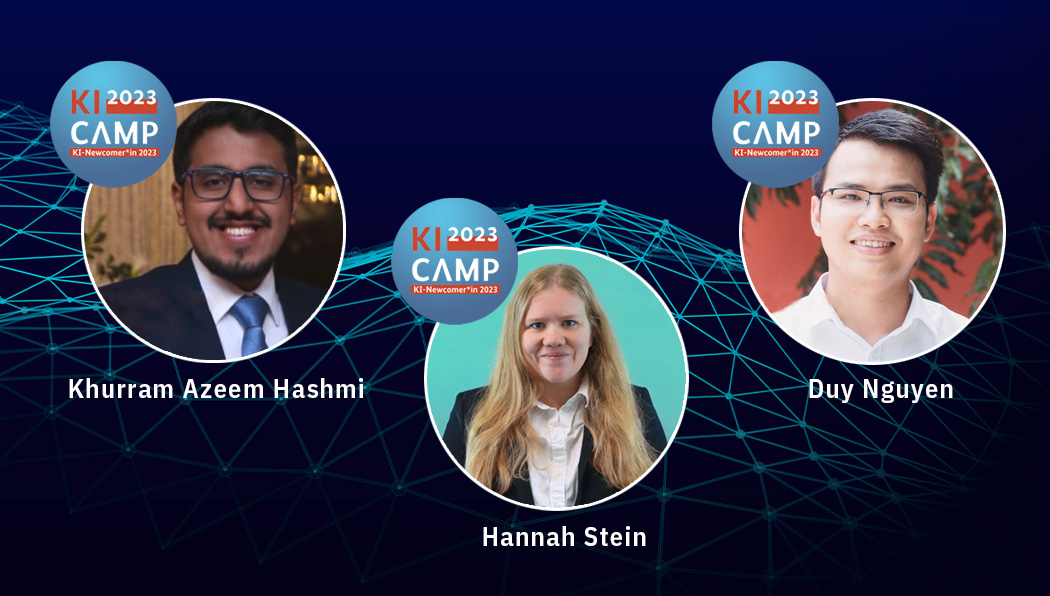With the award, the organisers not only honour outstanding talents who promote the development of AI in Germany with their innovative ideas. They are also offering the AI Newcomers 2023 the opportunity to publicly present their research at the AI Camp on 26 April 2023 in Berlin. Here you can vote for all three DFKI-candidates: KI-Camp
Hannah Stein
Hannah Stein is one of the nominees in the humanities and social sciences category. She is a doctoral student and research assistant at Saarland University and DFKI in the Smart Service Engineering Research Department headed by Prof. Dr. Wolfgang Maaß. She has already been working here as a research assistant and project manager since her studies in business administration. In the context of research projects in the domains of agriculture, food production and industrial production (e.g. Smart Farming World, EVAREST, SPAICER, QUASIM, FDA), she dealt with experimental approaches of design science, requirement analyses, studies on the benefit evaluation of AI-based smart services, and especially the monetary valuation of data and data ecosystems.
The focus has always been on the practical relevance of the results for end users, as well as the transfer into scientifically relevant publications, such as in conferences like INFORMATIK, International and Americas Conference on Information Systems. In her research, Hannah focuses in particular on the conception of solutions and investigation of problems at the interface between information technology and business management issues. Hannah Stein is researching how to transform subjective valuations, such as of company data or of personal data in social media, into objective and trackable AI-based pricing methods that could be applied in data markets and data ecosystems.
Duy Ho Minh Nguyen
Duy Ho Minh Nguyen is one of the nominees in the natural and life sciences category. He completed his master's degree in computer science at Saarland University and the Max Planck Institute for Informatics (MPI-INF) in April 2021. His research topics include optimisation algorithms, machine learning and transfer learning in particular. He then moved to the DFKI in the Interactive Machine Learning department, headed by Professor Dr. Daniel Sonntag.
From May to December 2021, Duy Ho Minh Nguyen was a research intern at the University of California San Diego (UCSD). There he investigated topics in domain adaptation and transfer learning for medical imaging. In August 2022, he was one of the selected candidates to attend the Oxford Machine Learning Summer School.
So far, he has published several papers in the field of computer vision, especially in the field of medical images, in high-level conferences and journals such as WACV, AAAI, CVPR, Knowledge-Based Systems and Medical Image Analysis Journal.
About his current research, he says: “I am interested in the transferability of self-supervised learning algorithms with applications in biomedicine. Due to the ability to infer feature representations from unlabelled data, I am convinced that self-supervised learning (SSL) can address the lack of labelled samples.”
Khurram Akeem Hashmi
Khurram Akeem Hashmi is a nominee in the category of computer science. Khurram Azeem Hashmi is a third-year PhD student at the University of Kaiserslautern-Landau (RPTU) and works as a researcher at the DFKI in the research department Augmented Vision headed by Prof. Dr. Didier Stricker.
He is currently researching novel methods to improve object recognition in videos and under difficult environmental conditions, such as harsh weather conditions. Since object recognition is one of the fundamental problems of computer vision, he believes that improving object recognition methods will facilitate various downstream tasks of computer vision, such as image/video annotation, object tracking and scene/video analysis under complex conditions.
He did his master's degree in computer science at RPTU. His other research interests include self-supervised representation learning for images and videos, dense prediction tasks and document image analysis. Within a short research period of 2.5 years, he achieved an h-index of 8 and has 17 publications in reputed research outlets such as BMVC, WACV, Journal of Imaging, IEEE Access and Sensors. In addition to being a reviewer for major computer vision conferences such as ECCV and BMVC, he actively reviews journal articles from IEEE Access, Springer Nature and Neurocomputing. He is also a co-tutor of the Master's lecture on Deep Learning at RPTU. Furthermore, his current work at DFKI focuses on the development of an energy-efficient autonomous navigation system for assembly robots that can move freely and avoid collisions.

